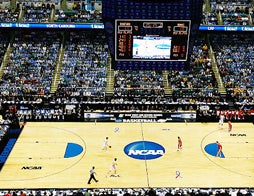This week, millions of Americans will spend too much time agonizing over, and speculating on the merits of Gators, Bison, Jayhawks, and Shockers.
It’s time for the NCAA March Madness.
Time for people to put aside the problems of the day and fill out brackets.
In an effort to get you ready for the tournament, College of Charleston professors and staff offer these eight tips to help you survive and thrive during the madness:
1. Pick with your head, not your heart.
It is natural to want to root for the underdog, your father’s alma mater or the college with the quirkiest mascot name. But that’s not always the best way to advance in the tournament brackets.
Set aside such emotions and trust what you see.
“A common buzz term used by basketball analysts is the ‘eye test’ –– if you watch a significant amount of college basketball, an educated fan can see that a team looks the part,” says College of Charleston Communication Professor Vince Benigni. “This is important with regard to two of the no. 4 regional seeds, defending-champion Louisville and preseason no. 1 Michigan State (their injured players are returning to form), both coached by national-championship winners.”
2. Forget your head and heart. Go with the coach.
John Kresse has the fifth highest winning percentage (.797) of any Division 1 NCAA college basketball coach with 560 wins and 143 losses during his 23 years as head coach of the College of Charleston.
 In other words, the man knows basketball.
In other words, the man knows basketball.
Watch Coach Kresse talk about half court offense.
His Final Four?
Wichita State –– “Because they are very good and Gregg Marshall spent eight years here as an assistant.”
Florida –– “A very experienced team with great talent and coaching.”
Michigan State –– “Very hot now with injured players back and a former national champion coach.”
Arizona –– “Extremely talented, deep bench and a proven coach.”
3. Drink coffee.
With games starting at noon and running well past midnight, chances are you will need a “boost” for work the next morning. In most cases, a regular cup of coffee will do. But if a great game goes into double overtime, you may have to pullout the big guns.
 You might need a cup of “Death Wish,” which is billed as having 200 percent more caffeine than your typical coffee shop brew. “Death Wish” is a favorite of College of Charleston news manager and coffee aficionado Hannah Ashe.
You might need a cup of “Death Wish,” which is billed as having 200 percent more caffeine than your typical coffee shop brew. “Death Wish” is a favorite of College of Charleston news manager and coffee aficionado Hannah Ashe.
“At 54.2 milligrams of caffeine per fluid ounce of coffee, Death Wish will fuel serious productivity at work after a long night of watching basketball.”
4. Don’t just sit there.
Your mother was right. You should not sit around the house all day and watch basketball.
Spending hour after hour watching others exercise will not help you stay fit. You need to turn off the game and move around.
“Exercise is important for your fitness,” says College of Charleston Health and Human Performance Professor Marie “Scooter” Barnette. “Keeps your lungs, heart, circulation in good health. Increases your immune system efficiency. Prevents cancer and diabetes.”
5. Don’t get too upset over upsets.
 Let’s face facts. You will not have a perfect bracket.
Let’s face facts. You will not have a perfect bracket.
No way. The odds of correctly predicting the outcome of every game in the NCAA tournament are 1 in 9,223,372,036,854,775,808.
So make sure that you are ready for the emotional roller coaster ahead as your carefully constructed bracket inevitably falls apart.
“First, before deciding to participate, focus on the playing versus winning aspects and do not overestimate the chances of winning,” says Psychology Professor Susan J. Simonian. “Be honest with yourself before you decide to play; is this a healthy choice for you, or do you tend to overemphasize and overvalue winning as the only positive outcome of these types of activities?”
6. Watch out for more than just upsets.
Most of you will complete your basketball brackets on the Internet. While this makes it easy to track your wins and losses, it also makes it easy for companies to track you.
“I would advise anyone who fills out an online bracket to assume that nothing they provide will be private,” says College of Charleston Computer Science Professor George Pothering.
7. Working it.
 Workers all across the nation are taking time out of their schedules to fill in their brackets, update their brackets or talk about their brackets. It is a reality. So what can employers do about the lost productivity?
Workers all across the nation are taking time out of their schedules to fill in their brackets, update their brackets or talk about their brackets. It is a reality. So what can employers do about the lost productivity?
Let it go.
“I’d advise managers to ignore pooling activity unless it becomes extreme, clearly disruptive,” says College of Charleston Business Professor Thomas Kent. “What would have a greater negative effect on the workforce and productivity – employees discussing brackets or telling employees they may not do brackets during company time? I think the latter when you consider how many people get involved and are interested in basketball pools.”
8. If you win your bracket contest, be humble.
“There is a fine line between sharing good news and bragging, and although you may believe you are merely sharing your joy, others may perceive you to be boastful or overly-competitive, “ says Professor Simonian. “If you are in any way inferring superiority (i.e. I am the best versus I was really lucky) you may want to keep your success to yourself.”




